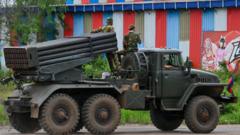Thailand and Cambodia have reached an agreement to hold peace talks in Malaysia on Monday in an effort to quell a violent conflict that has persisted for four days along their shared border. The Thai delegation, led by acting Prime Minister Phumtham Wechayachai, is set to participate following a significant intervention from US President Donald Trump, who contacted both leaders on Saturday urging for a rapid ceasefire.
The escalating clashes, which began on July 24, have led to the tragic loss of at least 33 soldiers and civilians, while many families have been forced to flee their homes. Despite the ongoing shelling, Trump noted in a social media post that both nations have shown interest in establishing a ceasefire and moving towards lasting peace. He emphasized the necessity of a quick resolution before any discussions regarding the high trade tariffs imposed on both countries could take place.
During his communications, Trump expressed that trade discussions, which currently impact cargo exports with steep tariffs of 36%, would be stalled pending an end to hostilities. He remarked, "I called the prime ministers of each and said, 'we're not going to make a trade deal unless you settle a war'." In response, both countries acknowledged Trump's support, yet Cambodia confirmed its commitment to a ceasefire proposal, and Thailand reiterated the importance of direct talks prior to any agreement.
The conflict's roots trace back to historical territorial disputes, prompting each side to accuse the other of initiating hostilities. Specifically, Thailand alleges that Cambodian forces began the conflict by using drones for reconnaissance near the border, while Cambodia argues that Thailand breached previous agreements by advancing troops near sacred sites.
The stakes are high as both nations navigate their diplomatic relations amidst a backdrop of rising tensions. With their historical rivalry resurfacing, the upcoming talks in Malaysia represent a crucial step toward stabilizing the border situation and addressing the humanitarian crisis that ensued. Observers hope that through dialogue, both nations can pave the way for a peaceful resolution and better trade relations in the future.



















